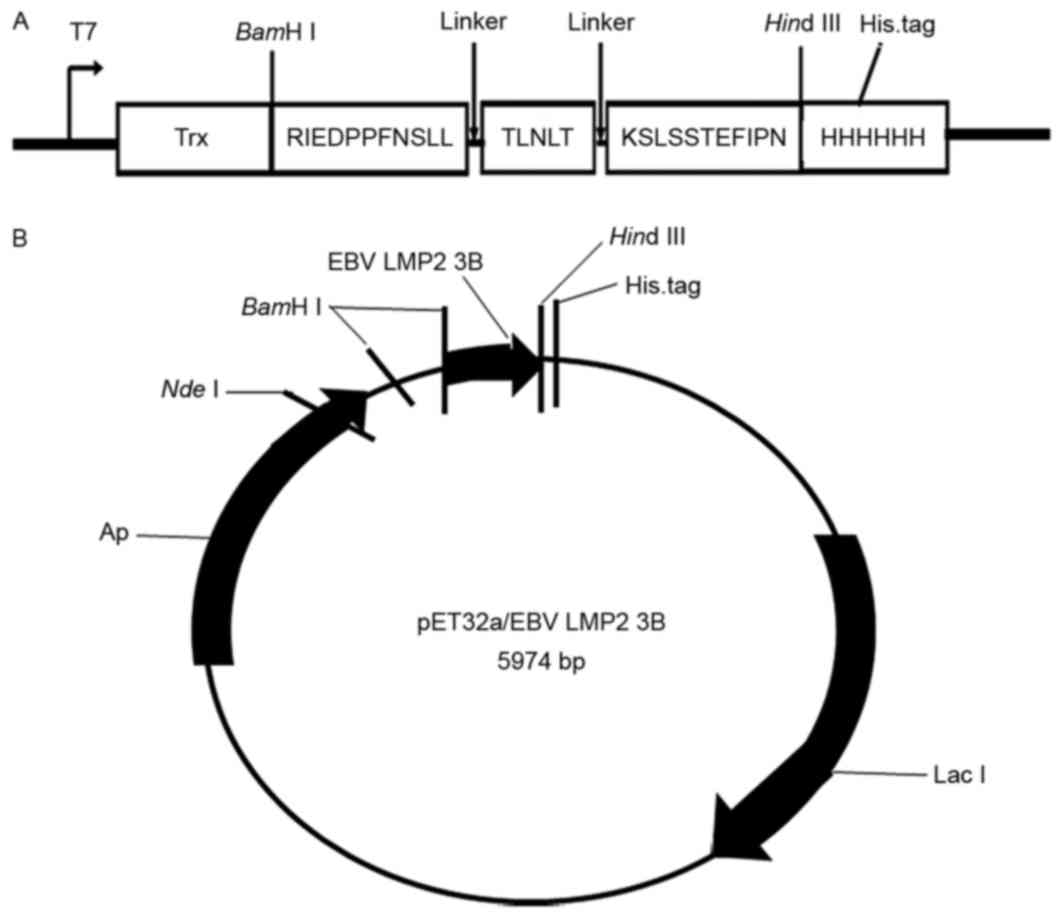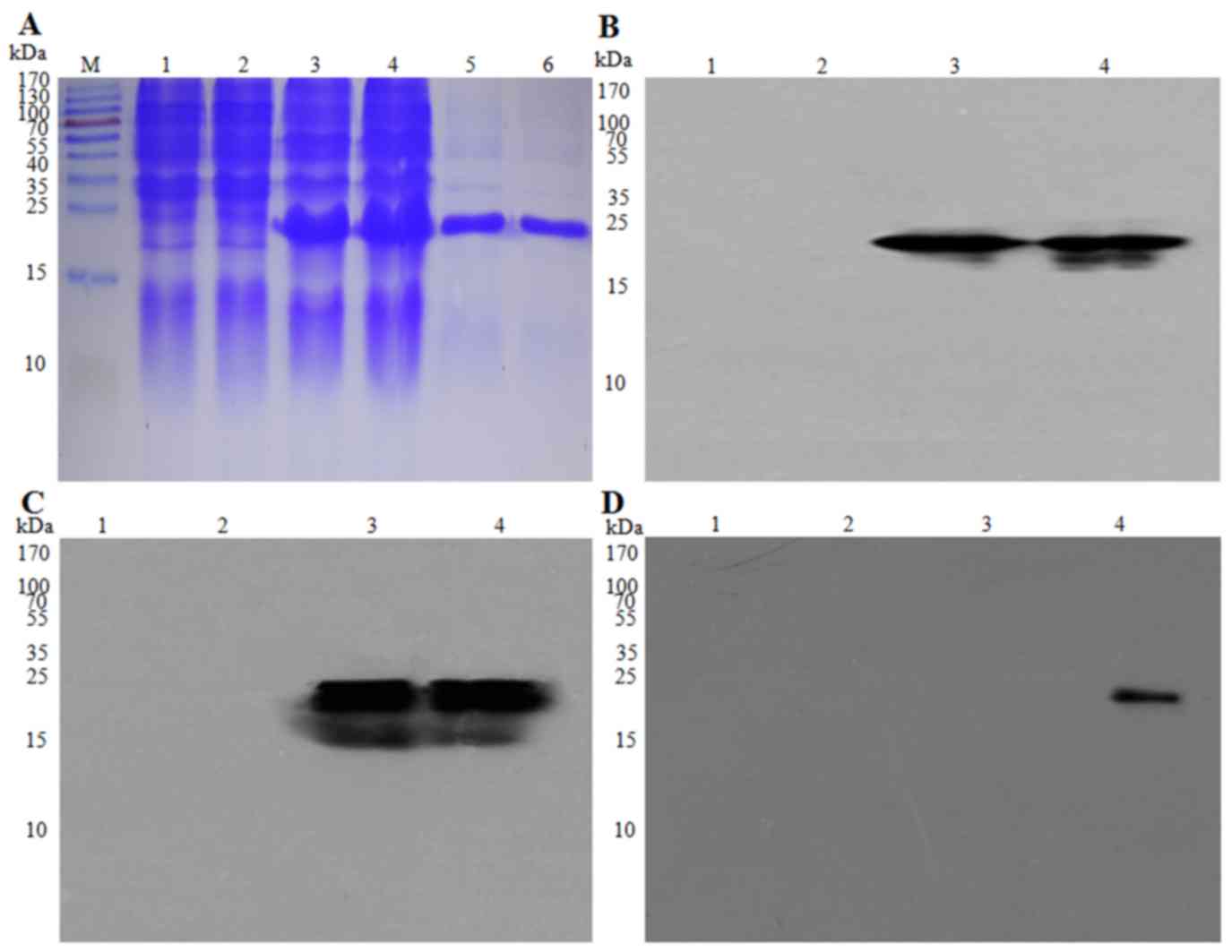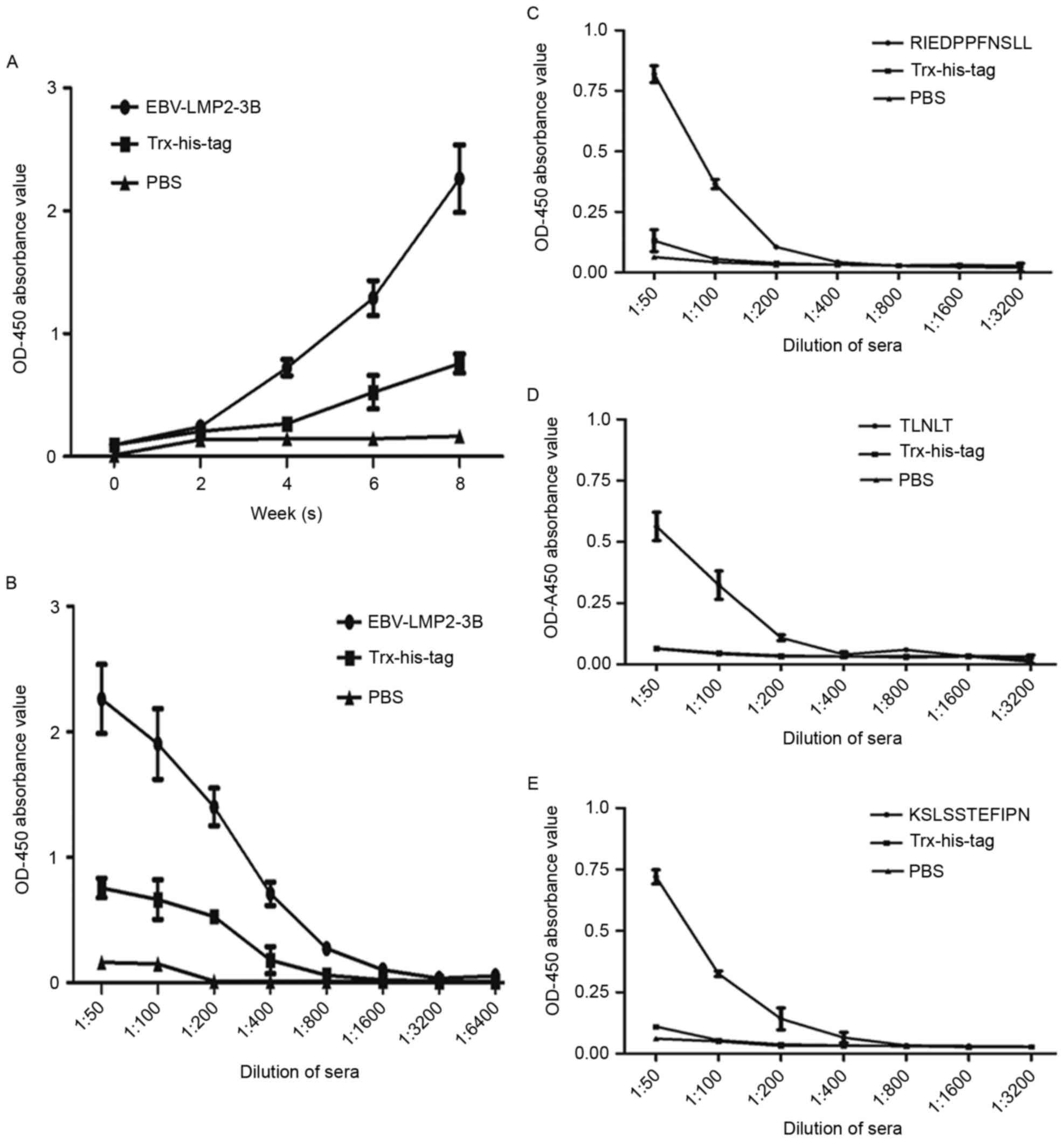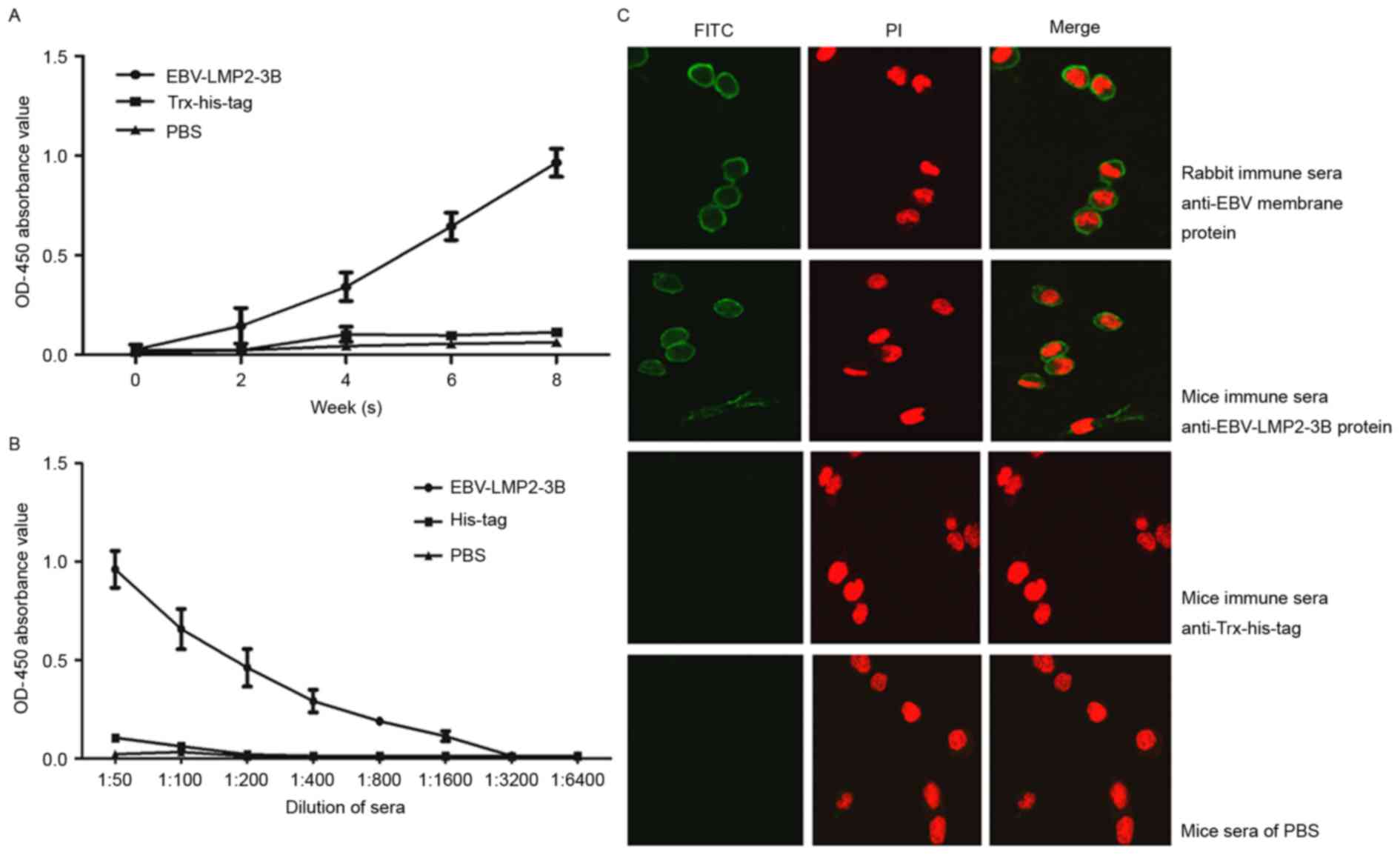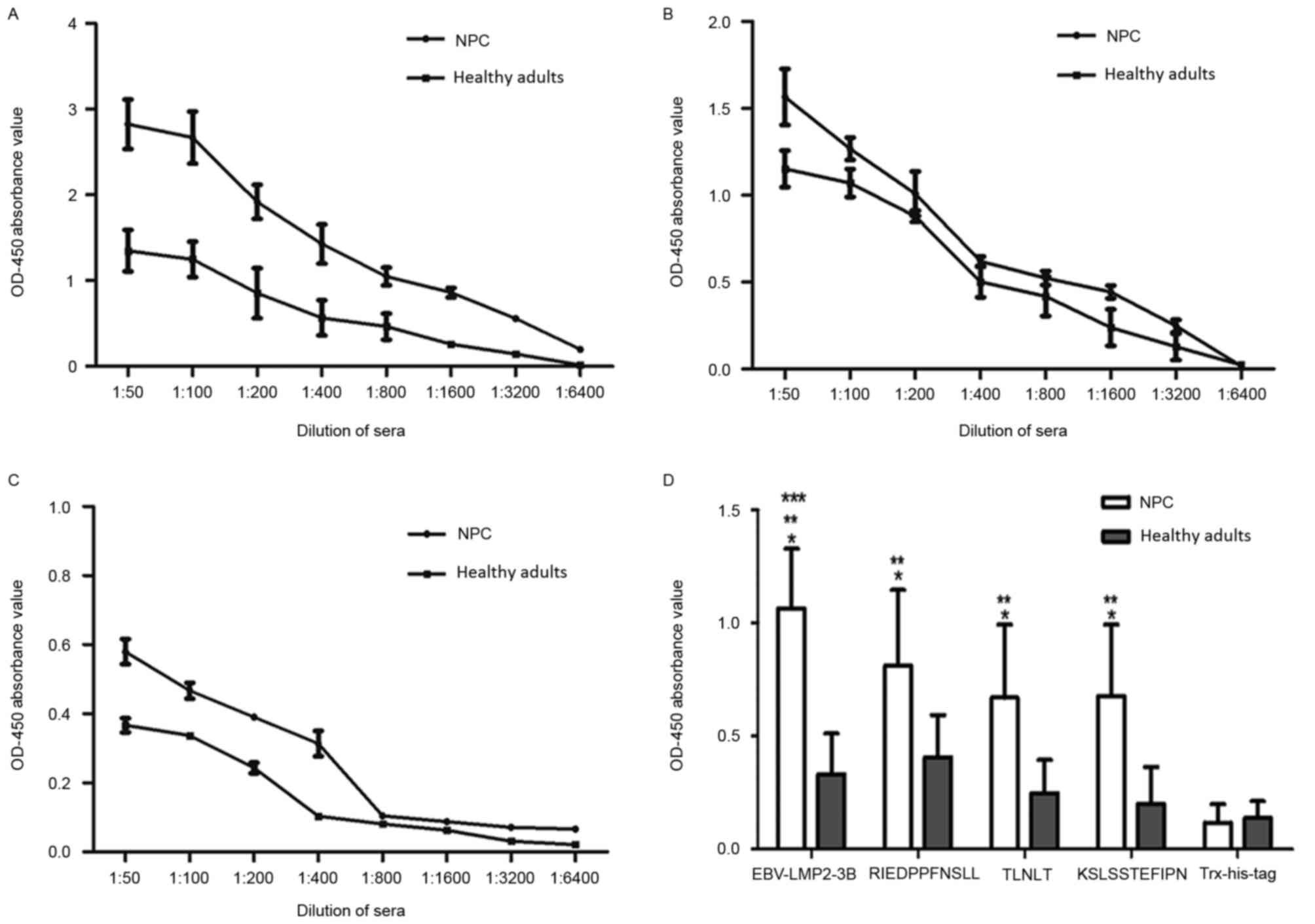|
1
|
Niedobitek G, Meru N and Delecluse HJ:
Epstein-Barr virus infection and human malignancies. Int J Exp
Path. 82:149–170. 2001. View Article : Google Scholar
|
|
2
|
Hutajulu SH, Kurnianda J, Tan IB and
Middeldorp JM: Therapeutic implications of Epstein-Barr virus
infection for the treatment of nasopharyngeal carcinoma. Ther Clin
Risk Manag. 10:721–736. 2014. View Article : Google Scholar : PubMed/NCBI
|
|
3
|
Niedobitek G: Epstein-Barr virus infection
in the pathogenesis of nasopharyngeal carcinoma. Mol Pathol.
53:248–254. 2000. View Article : Google Scholar : PubMed/NCBI
|
|
4
|
Shah KM and Young LS: Epstein-Barr virus
and carcinogenesis: Beyond Burkitt's lymphoma. Clin Microbiol
Infect. 15:982–988. 2009. View Article : Google Scholar : PubMed/NCBI
|
|
5
|
Sung NS, Edwards RH, Seillier-Moiseiwitsch
F, Perkins AG, Zeng Y and Raab-Traub N: Epstein-Barr virus strain
variation in nasopharyngeal carcinoma from the endemic and
non-endemic regions of China. Int J Cancer. 76:207–215. 1998.
View Article : Google Scholar : PubMed/NCBI
|
|
6
|
Middeldorp JM, Brink AA, van den Brule AJ
and Meijer CJ: Pathogenic roles for Epstein-Barr virus (EBV) gene
products in EBV-associated proliferative disorders. Crit Rev Oncol
Hematol. 45:1–36. 2003. View Article : Google Scholar : PubMed/NCBI
|
|
7
|
Dawson CW, Port RJ and Young LS: The role
of the EBV-encoded latent membrane proteins LMP1 and LMP2 in the
pathogenesis of nasopharyngeal carcinoma (NPC). Semin Cancer Biol.
22:144–153. 2012. View Article : Google Scholar : PubMed/NCBI
|
|
8
|
Cai WM, Li YW, Wu B, Liu YY, Hu YH, Gu XZ,
Liu HY and Wang GD: Serologic diagnosis of nasopharyngeal
carcinoma. A double-blind study of four EB virus antibodies with
evaluation by sequential discrimination. Int J Radiat Oncol Biol
Phys. 9:1763–1768. 1983. View Article : Google Scholar : PubMed/NCBI
|
|
9
|
Pang MF, Lin KW and Peh SC: The signaling
pathways of Epstein-Barr virus-encoded latent membrane protein 2A
(LMP2A) in latency and cancer. Cell Mol Biol Lett. 14:222–247.
2009. View Article : Google Scholar : PubMed/NCBI
|
|
10
|
Straathof KC, Leen AM, Buza EL, Taylor G,
Huls MH, Heslop HE, Rooney CM and Bollard CM: Characterization of
latent membrane protein 2 specificity in CTL lines from patients
with EBV-positive nasopharyngeal carcinoma and lymphoma. J Immunol.
175:4137–4147. 2005. View Article : Google Scholar : PubMed/NCBI
|
|
11
|
Chien YC, Chen JY, Liu MY, Yang HI, Hsu
MM, Chen CJ and Yang CS: Serologic markers of Epstein-Barr virus
infection and nasopharyngeal carcinoma in Taiwanese men. N Engl J
Med. 345:1877–1882. 2001. View Article : Google Scholar : PubMed/NCBI
|
|
12
|
Ji MF, Wang DK, Yu YL, Guo YQ, Liang JS,
Cheng WM, Zong YS, Chan KH, Ng SP, Wei WI, et al: Sustained
elevation of Epstein-Barr virus antibody levels preceding clinical
onset of nasopharyngeal carcinoma. Br J Cancer. 96:623–630. 2007.
View Article : Google Scholar : PubMed/NCBI
|
|
13
|
Cao SM, Liu Z, Jia WH, Huang QH, Liu Q,
Guo X, Huang TB, Ye W and Hong MH: Fluctuations of epstein-barr
virus serological antibodies and risk for nasopharyngeal carcinoma:
A prospective screening study with a 20-year follow-up. PLoS One.
6:e191002011. View Article : Google Scholar : PubMed/NCBI
|
|
14
|
Yu KJ, Hsu WL, Pfeiffer RM, Chiang CJ,
Wang CP, Lou PJ, Cheng YJ, Gravitt P, Diehl SR, Goldstein AM, et
al: Prognostic utility of anti-EBV antibody testing for defining
NPC risk among individuals from high-risk NPC families. Clin Cancer
Res. 17:1906–1914. 2011. View Article : Google Scholar : PubMed/NCBI
|
|
15
|
Xue X, Zhu S, Li W, Chen J, Ou Q, Zheng M,
Gong W and Zhang L: Identification and characterization of novel
B-cell epitopes within EBV latent membrane protein 2 (LMP2). Viral
Immunol. 24:227–236. 2011. View Article : Google Scholar : PubMed/NCBI
|
|
16
|
Lin X, Chen S, Xue X, Lu L, Zhu S, Li W,
Chen X, Zhong X, Jiang P, Sename TS, et al: Chimerically fused
antigen rich of overlapped epitopes from latent membrane protein 2
(LMP2) of Epstein-Barr virus as a potential vaccine and diagnostic
agent. Cell Mol Immunol. 13:492–501. 2016. View Article : Google Scholar : PubMed/NCBI
|
|
17
|
Han BL, Xu XY, Zhang CZ, Wu JJ, Han CF,
Wang H, Wang X, Wang GS, Yang SJ and Xie Y: Systematic review on
Epstein-Barr virus (EBV) DNA in diagnosis of nasopharyngeal
carcinoma in Asian populations. Asian Pac J Cancer Prev.
13:2577–2581. 2012. View Article : Google Scholar : PubMed/NCBI
|
|
18
|
Li S, Deng Y, Li X, Chen QP, Liao XC and
Qin X: Diagnostic value of Epstein-Barr virus capsid antigen-IgA in
nasopharyngeal carcinoma: A meta-analysis. Chin Med J (Engl).
123:1201–1205. 2010.PubMed/NCBI
|
|
19
|
Ng WT, Yau TK, Yung RW, Sze WM, Tsang AH,
Law AL and Lee AW: Screening for family members of patients with
nasopharyngeal carcinoma. Int J Cancer. 113:998–1001. 2005.
View Article : Google Scholar : PubMed/NCBI
|
|
20
|
Rea TD, Ashley RL, Russo JE and Buchwald
DS: A systematic study of Epstein-Barr virus serologic assays
following acute infection. Am J Clin Pathol. 117:156–161. 2002.
View Article : Google Scholar : PubMed/NCBI
|
|
21
|
Yi Z, Yuxi L, Chunren L, Sanwen C, Jihneng
W, Jisong Z and Huijong Z: Application of an immunoenzymatic method
and an immunoautoradiographic method for a mass survey of
nasopharyngeal carcinoma. Intervirology. 13:162–168. 1980.
View Article : Google Scholar : PubMed/NCBI
|
|
22
|
Stevens SJ, Zwaan CM, Verkuijlen SA and
Middeldorp JM: Epstein-Barr virus (EBV) serology for predicting
distant metastases in a white juvenile patient with nasopharyngeal
carcinoma and no clinical response to EBV lytic induction therapy.
Head Neck. 28:1040–1045. 2006. View Article : Google Scholar : PubMed/NCBI
|
|
23
|
Cai YL, Zheng YM, Wang W, Wei Y, Shen XX,
Cheng JR, Wu YS, Gao JQ, Zhong WM and Li J: Combined detection of
Epstein-Barr virus antibodies for serodiagnosis of nasopharyngeal
carcinoma. Nan Fang Yi Ke Da Xue Xue Bao. 30:2746–2748. 2010.(In
Chinese). PubMed/NCBI
|
|
24
|
Sun P, Chen C, Cheng YK, Zeng ZJ, Chen XL,
Liu LZ and Gu MF: Serologic biomarkers of Epstein-Barr virus
correlate with TNM classification according to the seventh edition
of the UICC/AJCC staging system for nasopharyngeal carcinoma. Eur
Arch Otorhinolaryngol. 271:2545–2554. 2014. View Article : Google Scholar : PubMed/NCBI
|
|
25
|
Connolly Y, Littler E, Sun N, Chen X,
Huang PC, Stacey SN and Arrand JR: Antibodies to Epstein-Barr virus
thymidine kinase: A characteristic marker for the serological
detection of nasopharyngeal carcinoma. Int J Cancer. 91:692–697.
2001. View Article : Google Scholar : PubMed/NCBI
|
|
26
|
Dardari R, Hinderer W, Lang D, Benider A,
El Gueddari B, Joab I, Benslimani A and Khyatti M: Antibody
responses to recombinant Epstein-Barr virus antigens in
nasopharyngeal carcinoma patients: Complementary test of ZEBRA
protein and early antigens p54 and p138. J Clin Microbiol.
39:3164–3170. 2001. View Article : Google Scholar : PubMed/NCBI
|
|
27
|
Karray H, Ayadi W, Fki L, Hammami A, Daoud
J, Drira MM, Frikha M, Jlidi R and Middeldorp JM: Comparison of
three different serological techniques for primary diagnosis and
monitoring of nasopharyngeal carcinoma in two age groups from
Tunisia. J Med Virol. 75:593–602. 2005. View Article : Google Scholar : PubMed/NCBI
|
|
28
|
van Grunsven WM, Spaan WJ and Middeldorp
JM: Localization and diagnostic application of immunodominant
domains of the BFRF3-encoded Epstein-Barr virus capsid protein. J
Infect Dis. 170:13–19. 1994. View Article : Google Scholar : PubMed/NCBI
|















